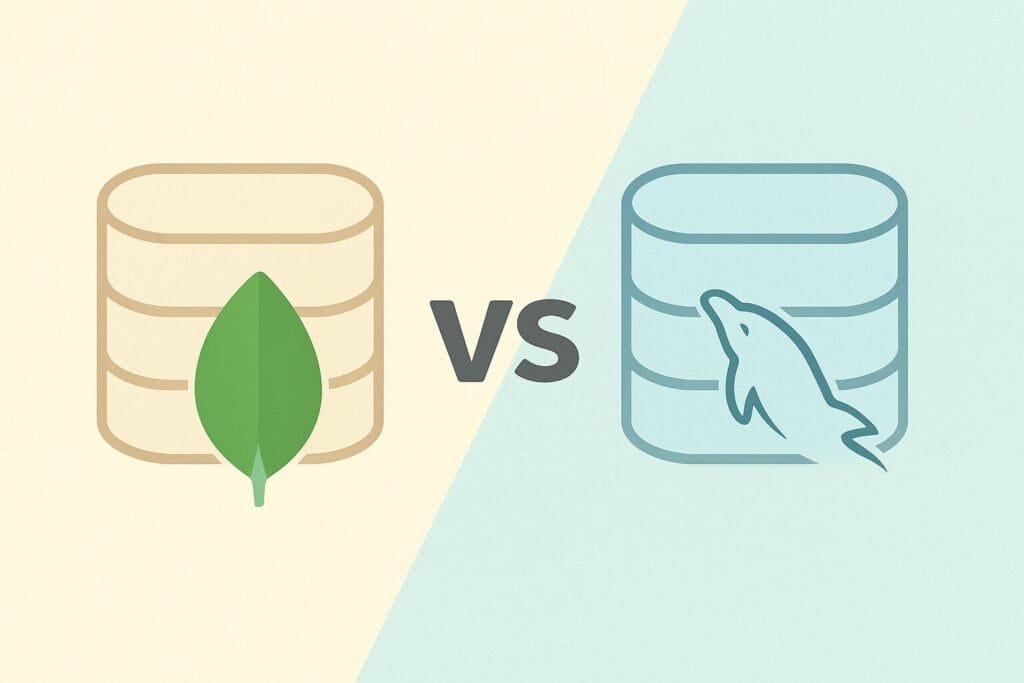When it comes to building scalable and reliable web applications, choosing the right database is crucial. Two of the most popular options in the developer community are MongoDB and MySQL. Both are powerful, but they have different strengths that make them suitable for different types of projects. In this article, we will explore their key features, use cases, performance, scalability, and security aspects to help you decide: MongoDB vs MySQL – which is better for modern web apps?

What Is MongoDB?
MongoDB is a NoSQL database designed for handling unstructured or semi-structured data. It stores data in JSON-like documents, making it flexible and ideal for applications that require frequent schema updates. MongoDB is widely used in modern applications, especially those dealing with large-scale data, IoT, real-time analytics, and content management systems.
What Is MySQL?
MySQL is a relational database management system (RDBMS) that uses structured query language (SQL). It stores data in tables with predefined schemas, ensuring consistency and data integrity. MySQL is known for its reliability and is widely used in e-commerce platforms, financial applications, and systems requiring complex transactions.
Key Differences Between MongoDB and MySQL
Below is a comparison table that highlights the major differences between MongoDB and MySQL:
| Feature | MongoDB | MySQL |
|---|---|---|
| Database Type | NoSQL, Document-Oriented | Relational (RDBMS) |
| Data Storage | JSON-like Documents | Tables and Rows |
| Schema | Flexible, Dynamic | Fixed, Predefined |
| Performance | Optimized for large volumes of unstructured data | Optimized for structured data and transactions |
| Scalability | Horizontal scaling with ease | Mainly vertical scaling |
| Transactions | Supports multi-document ACID transactions (since v4.0) | Full ACID compliance with strong transaction support |
| Query Language | MongoDB Query Language (MQL) | SQL (Structured Query Language) |
| Best Use Case | Real-time apps, IoT, analytics, content management | Financial apps, e-commerce, traditional business apps |
Performance Considerations
MongoDB often outperforms MySQL in scenarios where applications need to handle massive volumes of unstructured data. Because of its schema-less nature, it allows faster development cycles and easy scaling. However, MySQL excels in handling complex queries, relationships, and transactions with high levels of data integrity.
Scalability and Flexibility
Scalability is one of the biggest reasons many startups choose MongoDB. It allows horizontal scaling, meaning you can add more servers to distribute data easily. MySQL, on the other hand, primarily relies on vertical scaling (upgrading hardware), which may become expensive over time. That said, with technologies like MySQL Cluster and sharding, MySQL can also scale, but it is not as seamless as MongoDB.
Security Features
Both MongoDB and MySQL offer robust security features including authentication, authorization, and encryption. However, MySQL has a longer track record in enterprise-grade security, while MongoDB is continuously improving its security features for modern applications.
Community and Ecosystem
MySQL has been around since 1995 and has a massive global community of developers, extensive documentation, and enterprise support from Oracle. MongoDB, though newer, has rapidly built a strong ecosystem with MongoDB Atlas (its cloud offering), a rich set of libraries, and strong support for modern web stacks. Both have active developer communities and excellent documentation.
When to Choose MongoDB
- When your app needs to handle big data and unstructured information.
- For real-time analytics, IoT systems, or mobile apps with fast iteration needs.
- If horizontal scalability and cloud-native deployment are a priority.
When to Choose MySQL
- When you need strong data consistency and integrity.
- For applications with complex queries and transactional requirements.
- For e-commerce, financial apps, and legacy systems that rely on relational models.
Conclusion
So, MongoDB vs MySQL: which one should you choose? The answer depends on your application requirements. If you need flexibility, speed, and scalability for modern apps, MongoDB is the way to go. If your project demands structured data, strong consistency, and complex transactions, MySQL remains a rock-solid choice.
Ultimately, many companies even use both databases together depending on the project needs. For example, you might use MySQL for transactional data and MongoDB for analytics or user-generated content.
To learn more about database technologies, check out this MongoDB vs MySQL official comparison.

